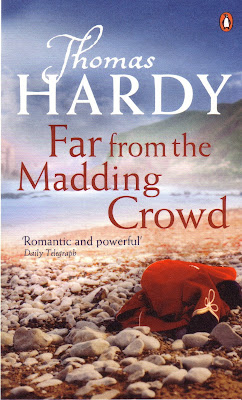Far from the Madding Crowd by Thomas Hardy: Book Review
A Thomas Hardy classic, set in the
Wessex countryside, the tale depicts the life of beautiful Bathsheba Everdene,
born to a humble background, who inherits her uncle’s farm upon his demise. Much
of the story revolves around Bathsheba’s three suitors who experience success
and failure in trying to woo her. Gabriel Oak, a shepherd by profession, is the
first to be struck by her beauty. Farmer Boldwood is the most persistent of the
lot, who also suffers the most cruelly through the story. Troy is the unscrupulous
charmer for whom Bathsheba falls, and in marrying him, alters the course of her
life to betrayal and tragedy.
 What is most remarkable about the
book is the characterization; it is the defining feature of the story. One is
likely to remember the composure and humility of Oak, the doggedness and pain
of Boldwood, and the fickleness ad charm of Troy for a long time after reading
the book. The three rivals are distinctly dissimilar in their nature, behavior and
social standing, and yet fall for the same girl. Their journey, their failures
and successes, their interactions with each other are very well depicted.
What is most remarkable about the
book is the characterization; it is the defining feature of the story. One is
likely to remember the composure and humility of Oak, the doggedness and pain
of Boldwood, and the fickleness ad charm of Troy for a long time after reading
the book. The three rivals are distinctly dissimilar in their nature, behavior and
social standing, and yet fall for the same girl. Their journey, their failures
and successes, their interactions with each other are very well depicted.
Another interesting thing about
the book is that the same character inspires different and sometimes
contrasting feeling. One may pity Oak when he is turned down by Bathsheba. But through
the story, he focuses on building his life, working well, being a reliable
support to Bathsheba, yet never nursing any false hope of marrying her. Maybe that’s
why he doesn’t suffer as much as the other two suitors. Oak inspires respect by
his commitment to work and to Bathsheba as his employer, and his goodwill
towards Boldwood, despite both of them being in love with the same girl.
Boldwood, on the other hand,
enters the story as a respectable, middle-aged bachelor, an extremely
successful farmer and a respected member of the society. He almost succeeds in
marrying Bathsheba twice, but faces disappointment both times. From being a
respectable character, Boldwood quickly degenerates to an emotionally
vulnerable man, negligent of his work, who sometimes begs Bathsheba to marry
him and other times despises her for hurting him. Being the most determined,
Boldwood continues to woo Bathsheba after her husband Troy goes missing,
pressing her for a promise to marry him in order to make amends for hurting
him. Helpless and cornered, Bathsheba desultorily agrees, only to be unable to
keep her promise due to circumstances beyond her control.
Troy begins his journey as a
disarming, straightforward young man carrying his heard on his sleeve,
hell-bent on winning over Bathsheba. The first few exchanges between these two
characters are so beautifully written, I don’t completely blame Bathsheba for
falling for him. Later we learn that Troy’s attachment to Bathsheba was
transient and he claims to love another girl, Fanny. And so he slips from the
pedestal to a despicable, insensitive coward who only wants to return to
Bathsheba for her money after Fanny’s untimely death.
The irony lies in Bathsheba
suffering betrayal and abandonment from Troy, after she unintentionally
inflicted pain on Boldwood and Oak. To be fair to Bathsheba, she never broke
her promise to Boldwood, but even the consideration of his proposal by her makes
him feverishly optimistic. Later in the story, she even agrees to marry him to
make up for hurting him. If anything, this is a story of unrequited love and
every character deals with it in a very different way.
The ending of the story is
completely unpredictable. While reading this book, a reader may make many
conjectures about who Bathsheba ends up with, if not alone, and most of these
conjectures are likely to be wrong. The last few chapters are a medley of
tragedy and hope in equal proportions.
In my opinion, Far from the Madding Crowd is a very
enjoyable story; the narrative is slow in a pleasant way. I was gripped by this
book right from the first chapter and it does not, like some classics, take a
few chapters to generate interest. The story is evergreen and easily replicable
in the contemporary context. I thoroughly enjoyed reading the book and look
forward to exploring other works by Thomas Hardy.

Comments
Post a Comment